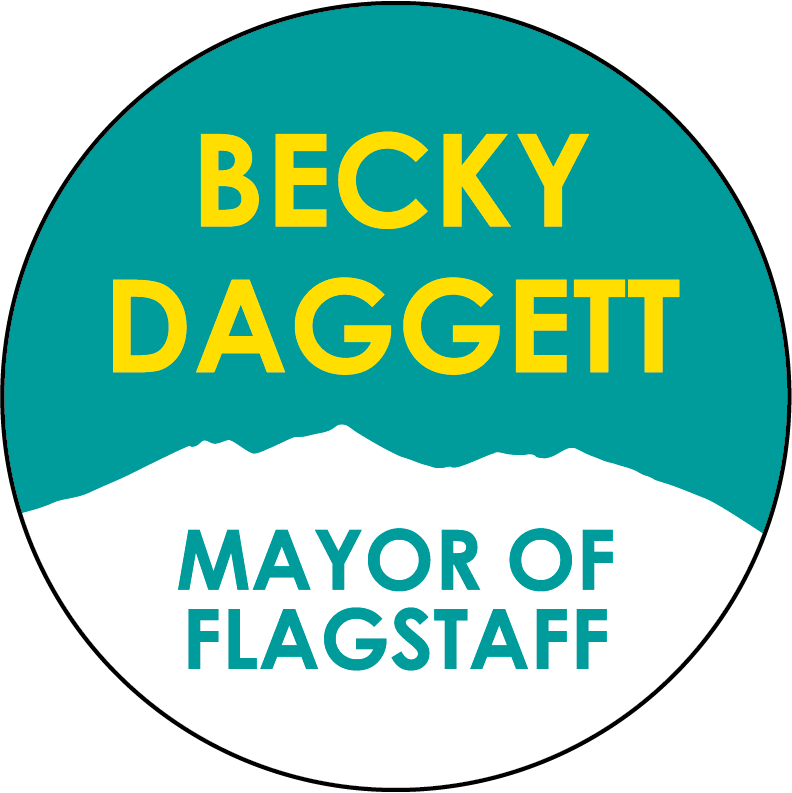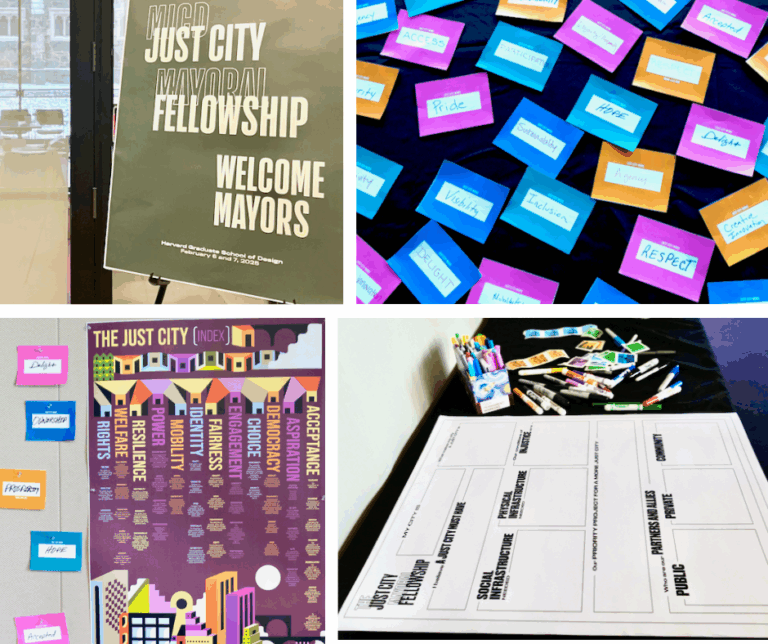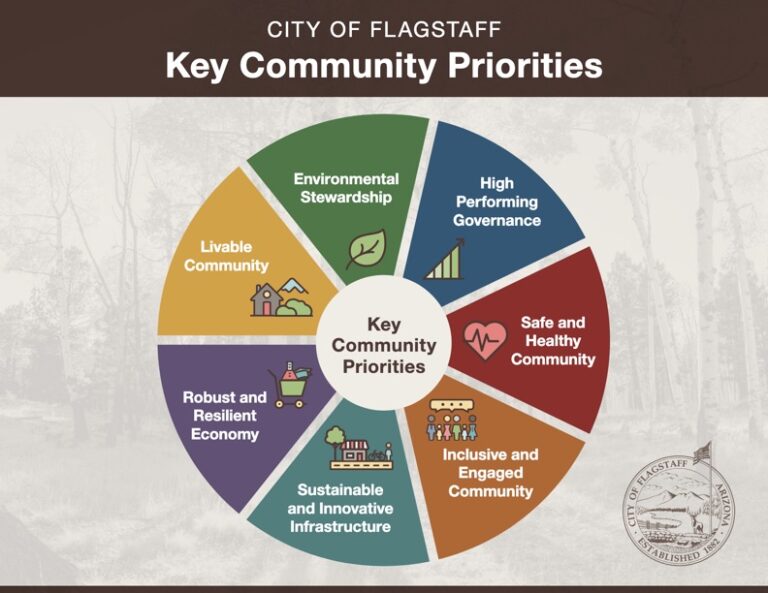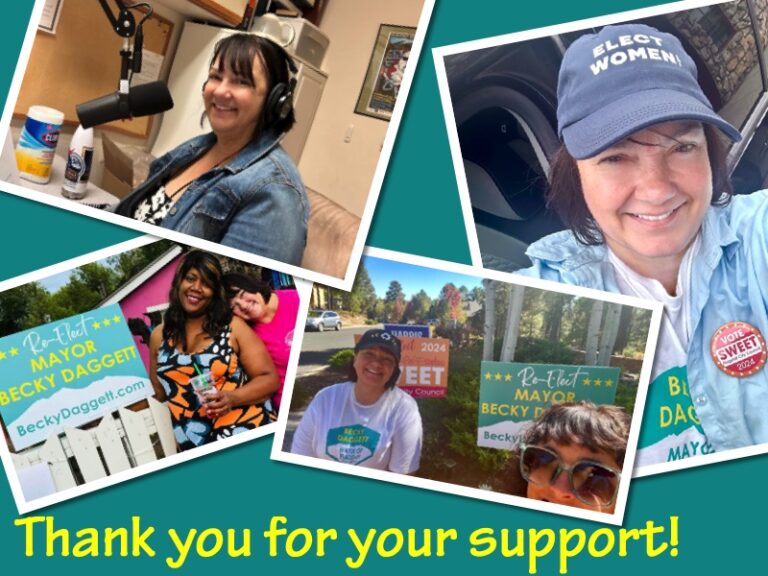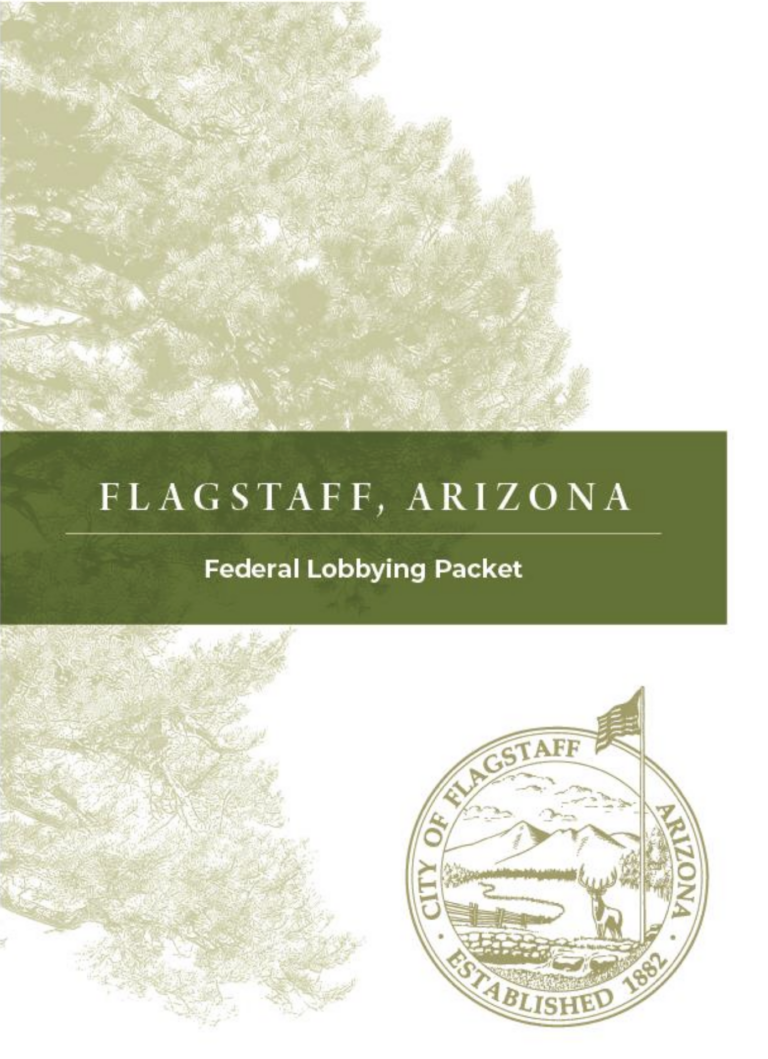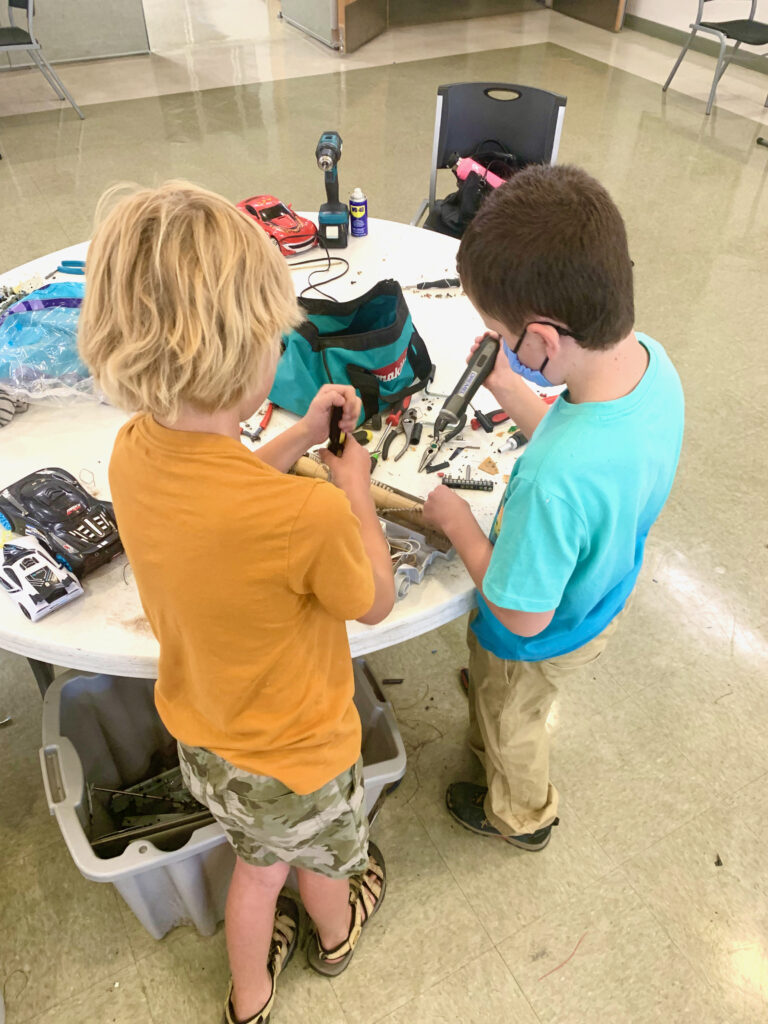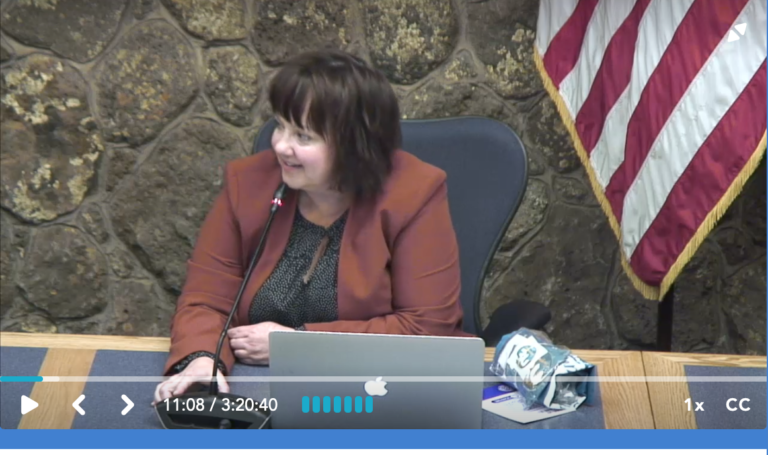My Weekly Answers to the Arizona Daily Sun’s Questions
Each week, the publisher of the Arizona Daily Sun poses a question to the candidates for city council and mayor. Below are each of my answers. Local journalism is so important and I encourage you to subscribe. I’ll add additional answers as they appear in the newspaper.
What is your final message to Flagstaff voters?
Thank you for being a good voter. If you take the time to subscribe to your local newspaper and to read these weekly questions, I’m going to make the leap and assume you research the candidates and study the issues all the way down to the bottom of every ballot. We live in Flagstaff for different reasons. Some of us have ancestors who have always considered this region their homelands, some come from generations of Flagstaff residents who helped to shape this town, many came for NAU and fell in love, and some were recently attracted by the clean air and mountains. Regardless of how or why you landed here, you are part of our community and will help shape its future. I look forward to working with you, learning more about your experiences in Flagstaff, and building an even stronger community. Please encourage your friends to vote!
What was an important moment in your life that led to your interest in public office?
Growing up, I had an interest in community service and I’ve volunteered for various organizations since elementary school. I’m interested in many aspects of community life which has led me to jobs with local nonprofits as well as many volunteer activities. I’ve also been involved with many—leading some—local and statewide campaigns dealing with a range of issues including land and water conservation, park creation, trail connections and construction, and candidate campaigns. My experience in these areas and with these issues led me to decide to run for city council to serve our community in a new way. To me, it’s important to not only care, but to take action and be an active part of positive change. I’m so glad that I did because I enjoy this work and am deepening my knowledge about a variety of issues. I appreciate voters giving me this opportunity.
How should Flagstaff try to retain and attract businesses?
By being a place people want to live and raise their families, that supports local businesses and workforce housing, and protects its water resources. Our strengths include our local academic and research institutions and the management of our current water resources and planning for future water needs. Flagstaff’s cost of housing puts us at a disadvantage both for helping businesses grow and for attracting appropriate new businesses. Flagstaff’s Economic Vitality Division offers various job creation incentives and the city owns the business incubator and the accelerator located near Buffalo Park and operated by Moonshot. I was the city’s Business Retention and Expansion Manager for a couple of years and my job was to help keep businesses here and problem-solve ways to help them grow. That’s still a big focus of the city. The entities working to strengthen Flagstaff’s economy understand our unique strengths and work to build on them.
Of the other City Council candidates, who would you endorse and why?
It’s important to me that the council function in a productive, transparent, and inclusive manner. I’m not concerned about unanimity, but I am concerned that each councilmember has opportunities to ask questions of staff and each other and understands that each of us has the duty to vote in the way we believe best serves the community. I’ve demonstrated that I can work with different personalities and with people who have different priorities. I work well with Councilmember Sweet and value her diligence and contributions to city council. I’ve known and worked with Robert Breunig for many years and know him to be thoughtful and willing to listen. I haven’t had the opportunity to work with the other candidates on the ballot, but feel confident that I could form a productive working relationship with any of the other four.
How should Flagstaff be managing its growth and development?
In a planned and thoughtful manner. Flagstaff has planned for its growth for several decades. From open space protection, to Flagstaff Urban Trails System connections, to transportation throughout town—we’ve worked to ensure Flagstaff retains its character. Thoughtful planning includes adequate housing and water resources. I’ve been involved with several planning efforts and policy initiatives long before my time on council. From working on the original Regional Plan to running the campaigns to protect land on Observatory Mesa and at Rogers Lake, I’ve recognized that planning for our future requires trying to balance several, sometime competing, needs. No community remains frozen in time and it’s imperative that our community stays involved in planning for our future.
What is your stance on the two city propositions on this year’s ballot?
I support Prop 487 (BBB sales tax) and Prop 488 (Mountain Line transit). The BBB tax pays for many things we all appreciate, including the Flagstaff Urban Trails System, parks/recreation facilities/open space, sports field maintenance, playground equipment, public art, and grants to local arts/sciences/cultural non-profits. Prop 487 renews the 2% sales tax on hotel/motel/AirBnB rentals, restaurant meals, and alcohol purchases in bars and restaurants; 68% of this tax is paid by visitors. Prop 488 renews and slightly increases the transit tax to allow for more frequent, expanded service. Mountain Line will replace buses that age out of service with zero-emission buses and will continue to increase ridership. With expanded and more frequent service, people who depend on it to get to school or jobs will have greater mobility and by making service more convenient, ridership will continue to grow—easing congestion for everyone.
What should the relationship look like between Flagstaff and Northern Arizona University?
I have fond memories of attending NAU, hanging out with friends downtown, and doing community service projects with Kayettes, a campus service organization. I was lucky enough to find an internship locally with Big Brothers Big Sisters which set me on a path of public service. As an adult, I’ve enjoyed speaking to NAU classes and meeting with student groups. NAU is important to Flagstaff and vice versa and neither would be what we are without the other. The times when we’ve had the strongest relationship have been when we’re having regular conversations, including the hard ones, and when we’re demonstrating respect for each other. The city and NAU have an excellent relationship and line of communication currently because each values the relationship and the partnership. We benefit from each other and can build even more successful partnerships with continued concern about how our actions impact the other.
What do you think about the current status of the Climate Action and Adaptation Plan?
I support the Carbon Neutrality Plan (CNP)—which replaced the CAAP— for several reasons, including the positive impacts that ensuring clean air and water, reduced energy use, increased safety of walking/biking, new jobs, and healthy forests will have on our community. Flagstaff is on its way to meeting its residential CNP solar goals, thanks to the nearly 1,000 residents who’ve installed solar. We’ve met our goal of powering city buildings with clean energy. The estimate to implement the CNP is $600M, and one part of the analysis that doesn’t get as much attention is the estimated positive financial impact, calculated to be $621M through savings and additional revenue, for a net positive of $21M. This implementation estimate also doesn’t account for the costs of not addressing air quality, energy efficiency, pedestrian safety, etc. There’s significant work to do and I encourage readers to reach out to the city’s sustainability office.
What steps should Flagstaff take to address affordable housing?
Our community has created affordable rental housing utilizing tax credits, federal rescue plan money, and funding through HUD. In the near term, hundreds of such units will be created and this will relieve some pressure on Flagstaff’s rental market. The recent housing bond will be allocated to four project areas, including combining bond funding and several other sources to renovate and add units in all publicly owned housing. The city has a land trust—city-owned land under a long-term lease. This removes the land cost and the housing maintains its affordability when resold—in this aspect it’s similar to Habitat for Humanity’s forthcoming starter homes. There are fewer public dollars available for owner-occupied housing, but the city offers down payment assistance and is examining codes and policies to ensure they have their intended result. Flagstaff needs authority from the Legislature to require affordable housing in private development.
What is your favorite part about Flagstaff and/or northern Arizona?
I love the forest—the smells, wildlife, plants, clean air, and views. Being outside is the best way I can sort my thoughts and relieve stress. When I’m short on time, I’m grateful that I can head out to the section of the Flagstaff Urban Trail System (FUTS) near my house. Nearby protected open spaces and the FUTS are treasures and I’m grateful for the planning and forethought that protected this land and built the FUTS. While being outside drew me Flagstaff, the thing that has anchored me in Flagstaff is the generosity and care shown to me and others by the people of Flagstaff. I’ve witnessed this community coming together time and time again to support each other, local youth, animals, and anyone else who needed assistance. I think about how fortunate I am to live in Flagstaff, surrounded by such beauty—both natural and human—often.
What steps should Flagstaff take to address its traffic congestion?
Flagstaff’s transportation plans include some road repair, redesign, and new construction of “complete streets”—streets that are designed to move people in cars, public transit, on bikes and on foot. There are two near-term transportation projects that are intended to give residents and visitors additional routes around town. The Lone Tree Overpass will take vehicles, bikes, and pedestrians over the BNSF tracks at Lone Tree and the Beulahextension and roundabout extends Beulah and aligns University on both sides of Milton. It’s critical that transportation projects encompass all types of transportation. More people will choose to take transit, ride their bikes, or walk for some or all trips if those methods of transportation are convenient, safe, and enjoyable. Better road connectivity and more people on the bus or on their bikes or their feet means fewer cars on the road and less congestion for everyone.
How do you feel about the impact of the minimum wage in Flagstaff?
The minimum wage originated as a citizens’ initiative whose organizers collected enough signatures to place on the ballot and passed by Flagstaff voters. I’m not aware of quantitative data about the impact of the minimum wage; however, I anecdotally hear from residents and the business community alike on this complex issue. Flagstaff residents have shared with me their struggles to afford living in Flagstaff while residential rents and housing prices have risen at unprecedented rates. I also hear from business owners and nonprofit leaders who say their organizations are struggling to keep up with the minimum wage. Good paying jobs are critical to Flagstaff’s economy, local businesses are the backbone of our community, and workers deserve just compensation. I deeply want local businesses to thrive and the workers of Flagstaff to afford to live here. I’ll keep advocating for a balanced economy, more good paying jobs, and supporting local businesses.
How will you navigate public comments before Council?
Public input is critical to my understanding of what matters to Flagstaff residents. I encourage feedback of all kinds—written, in person, or when I’m out in the community. At city hall, I strive to create a welcoming atmosphere where residents can feel comfortable delivering their comments—whether their views are in the minority or majority or even unpopular. Before I was elected, I spoke before council many times and always felt a little nervous. I draw on that experience, and in addition to helping others feel valued, I listen intently and with an open mind. Public comment informs my decision-making—I trust that the public sees this demonstrated. Ultimately, I have to make decisions that I believe are in the community’s best interest, and I’m grateful we have an engaged community that cares about the decisions that I, and the rest of the council, make.
What is the most critical factor in creating a positive local economy into the future?
Our economy depends upon a skilled workforce, good paying and low impact jobs, entrepreneurs willing to start businesses, utilization of Flagstaff’s strengths, and investment in the form of customers, infrastructure, and partnerships. It also depends on affordable housing—addressed in a future response. Flagstaff is fortunate to have talented teams focused on addressing workforce needs and entrepreneurial support, such as FUSD, CCC, NAU, Workforce Development Board, Chamber of Commerce, Moonshot, city’s Economic Vitality Team, and the Economic Collaborative of NAZ. Flagstaff’s strengths include these organizations, a culture of discovery and creation, ready access to the beautiful natural environment and dark skies, and transportation infrastructure. Our community is invested in the success of our local businesses, we’re an attractive place to visit, and cooperation and partnerships between institutions, researchers, and entrepreneurs are strong. Good paying jobs, sustaining our resources, and maintaining our unique character are our goals and all necessary elements.
When have you changed your mind?
I’ve been involved with local issues for some 25 years—from protecting open spaces, to obtaining land to extend the FUTS, to land use planning and the arts. I’ve always been aware that workforce housing is an issue here. Yet the more I’ve witnessed the struggles of my neighbors and learned about the complexities on this topic, the more I now believe workforce housing is one of our most pressing problems. Will Flagstaff be known as a place where hard-working people can raise a family and contribute to our community, or will we succumb to the pressures plaguing so many other mountain towns? While the city council doesn’t have control over all of those pressures, I will continue to do everything I can to increase workforce housing. Even when I am confidently informed on an issue, I remain open-minded that other perspectives can provide context I may not have considered.
How should Flagstaff handle water issues going forward?
Flagstaff’s water resources are a priority, and one of the fundamental duties for our city is the delivery of adequate, clean water and managing stormwater and wastewater. Although not required to do so, Flagstaff applied for and received an Adequate Water Supply Designation from the Arizona Department of Water Resources in 2013. This designation means that Flagstaff has demonstrated a 100-year physical supply of water and is now required to report annually to maintain the designation. The majority of our water currently comes from groundwater in the Coconino Aquifer. To maintain a safe yield—while factoring in effects of climate change and not depleting the aquifer—we must maintain a diversity of water resources along with strong conservation efforts. Likewise, we must continue to invest in maintaining current, and constructing necessary new, infrastructure. Water is critical to all life and should be treated as the precious resource that it is.
What’s the main reason you’re running for office?
I’m deeply invested in the health of our community as I’ve demonstrated throughout the many years I’ve served it. Throughout these years of service to our community, whether through land use planning, economic development, education, or arts and culture, I’ve honed skills that are useful in my work as mayor. I’m a good listener, I seek out different perspectives, show up prepared, and am skilled in consensus building. I take my role as your mayor very seriously and understand how sacred your trust is. It’s my honor to serve you, discuss local issues with you, and to help make city hall a place in which you feel comfortable and welcome. Likewise, it’s my honor to represent our community’s interests with our partner governments and agencies. I pledge to continue working on your behalf, advocating for our community, and representing Flagstaff with dignity and effectiveness.
